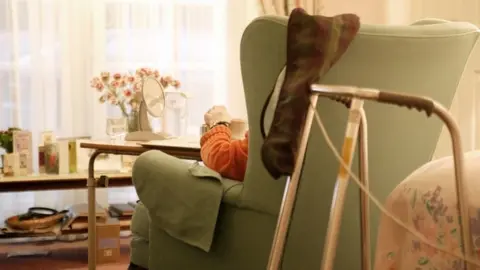Covid: Care home visits advice impractical, say charities
 SPL
SPLThe government is facing criticism over its guidance on safe visits to care homes in England.
Labour and a number of charities have described the suggestions, including floor-to-ceiling screens, designated visitor pods and window visits, as impractical.
Alzheimer's Society has said it "completely misses the point".
Justice Secretary Robert Buckland told BBC Radio 4's Today programme the guidance was "non-exhaustive".
The updated government advice, which came into effect on Thursday, says care homes - especially those which have not allowed visits since March - "will be encouraged and supported to provide safe visiting opportunities".
Visits should be "tailored to residents and facilities and should prioritise residents and staff's safety" to limit the spread of coronavirus, the advice says, with measures such as social distancing and personal protective equipment (PPE).
Care minister Helen Whately said the new measures would give people more opportunities to see loved ones "in a safe way".
However, Julia Jones, co-founder of dementia charity John's Campaign, told the Today programme that visits should be more "meaningful" than meeting through a window.
"When people are in the later stages of dementia, when people love each other, when people are approaching the end of their lives, they need to hold hands," she said.
The chief executive of leading care home group MHA, Sam Monaghan, told the programme the best way to carry out Covid-secure visits in care homes was "through routine testing of at least one relative for each resident".
Asked about such a scheme, Mr Buckland stressed the government was "interested in all ideas that are Covid-compliant" and that the guidance was not an exhaustive list of options.
The guidance also suggests:
- Visitors and residents enter through different entrances, meet in Covid-secure areas/pods separated by floor-to-ceiling screens, and visitors should not enter or pass through the care home
- Window visits where visitors don't need to come inside the care home or they remain in their car, and the resident is socially distanced
- Outdoor visits - with one other person - in areas which can be accessed without anyone going through a shared building
- Virtual visits, with care homes encouraging the use of video calls
All face-to-face visits were banned during the first national lockdown in the spring.
Guidance in England over recent months has allowed visits on a "limited basis" where alternative arrangements were not possible, but visits have been severely curtailed or prohibited entirely in those areas subject to enhanced restrictions, which have applied to large parts of England.
Ms Whately said she knew the restrictions on visiting had been "incredibly painful" and she had been "in tears" with some of the stories she had heard.
She said the government was "absolutely trying to enable more visiting" but, against the "backdrop of this second wave", it was "only right that we make sure visiting care homes is safe".
She said a trial would start later this week as part of plans to carry out testing on visitors to care homes.
The government also said a new national programme for weekly testing of professionals who regularly visit care homes would be "rolled out in the coming weeks" following a pilot in Cambridgeshire, Peterborough and Northamptonshire.
'Prison-style screens'
Labour's shadow care minister Liz Kendall said many care homes would not be able to comply with the government's requirements which meant "in reality thousands of families are likely to be banned from visiting their loved ones".
She said instead of suggesting measures such as screens, the government should "designate a single family member as a key worker - making them a priority for weekly testing and proper PPE".
Kate Lee, chief executive at Alzheimer's Society, said: "We're devastated by today's new care home visitor guidance - it completely misses the point: this attempt to protect people will kill them."
She said the pandemic had left people with dementia isolated and thousands had died. The guidelines "completely ignore the vital role of family carers in providing the care for their loved ones with dementia that no one else can", she added.
She said the "prison-style screens" proposed by the government with people speaking through phones were "frankly ridiculous when you consider someone with advanced dementia can often be bed-bound and struggling to speak".
That view was echoed by Caroline Abrahams, charity director at Age UK, who said she was "acutely aware" that the methods being sanctioned were "unlikely to be useable by many older people with dementia, or indeed sensory loss".
She added: "Overall we think this new guidance is too restrictive. In practice we fear it will result in many care homes halting meaningful visiting altogether, because they will be unable to comply with the requirements laid down."
